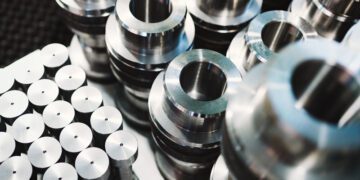In the metallurgical arena, specialty alloys stand out as customized solutions tailored for specific applications. These alloys, designed for superior performance, are witnessing a surge in demand across various industries, reflecting the evolving needs of modern applications.
“As industries evolve and challenges diversify, specialty alloys emerge as the champions of adaptability and performance, tailoring solutions to meet precise requirements.”
1. Defining Specialty Alloys: Beyond the Ordinary
Specialty alloys are unique combinations of metals designed to exhibit specific characteristics not usually found in conventional metals. Whether it’s high temperature resistance, magnetic properties, or enhanced strength, these alloys cater to niche requirements.
2. Aerospace: Soaring with Strength and Lightness
The aerospace industry’s need for materials that can withstand extreme conditions while being lightweight has amplified the demand for titanium and nickel-based alloys. These materials resist corrosion, endure high temperatures, and provide the strength-to-weight ratios essential for flight.
3. Medical: Biocompatibility and Precision
In the medical field, the demand is for alloys that are biocompatible, resistant to bodily fluids, and non-toxic. Cobalt-chromium, titanium, and certain stainless steels have found favor in surgical instruments, orthopedic implants, and even in medical devices like pacemakers.
4. Energy: Powering Ahead with Resilience
Whether in the depths of the ocean in oil and gas extraction or in nuclear reactors, specialty alloys play a crucial role. Alloys that can endure corrosive environments, high pressures, and intense radiation are in high demand, ensuring safety and efficiency.
5. Electronics: Conducting the Future
With the miniaturization of electronic components, there’s a growing need for metals that offer superior conductivity, thermal stability, and resistance to oxidation. Alloys of gold, silver, and copper, among others, are extensively used in connectors, switches, and other critical components.
6. Automotive: Driving Change with Performance Alloys
The automotive industry, amid its shift to electric vehicles, is seeking alloys that cater to new challenges. From high-conductivity alloys for batteries to lightweight materials that enhance fuel efficiency, specialty alloys are steering the future of transportation.
7. Defense: Armoring Up with Advanced Materials
The defense sector demands materials that offer a blend of durability, stealth, and performance. Alloys designed for armor plating, missile components, and naval applications are continuously being developed to provide an edge on the battlefield.
In essence, the story of specialty alloys is one of continuous evolution. As industries push the boundaries of what’s possible, these custom-designed materials rise to the occasion, ensuring that we have the right metal for every task. The future, undoubtedly, will bring new challenges, but with the versatility and adaptability of specialty alloys, we’re well-equipped to meet them.




















